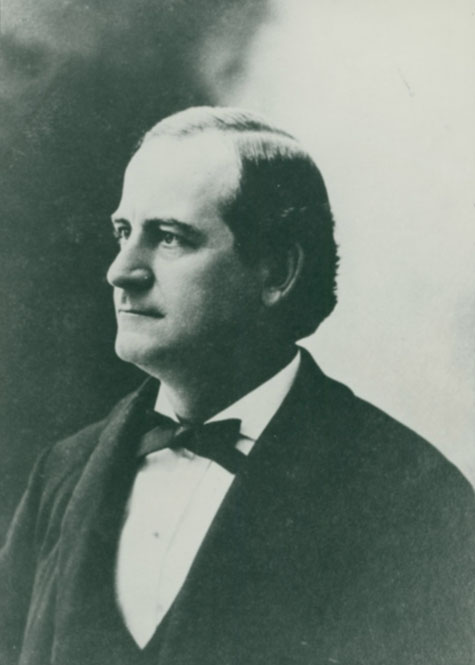
Willa Cather and William Jennings
Bryan
By Doug Boilesen, 2022
William Jennings Bryan, Nebraska's
Boy Orator of the Platte, the Great Commoner and
leader of the Populist movement in the late nineteenth and early
twentieth century played a prominent role in American politics
and popular culture. Bryan unsuccessfully ran for President three
times, was Secretary of State under President Wilson but resigned
in 1915 over Wilson's handling of the sinking of the Luisitania
by Germany as he thought Wilson was changing his neutrality position
and that this would lead to the United States entering the war.
Bryan was popular in Nebraska but
much of the popular press, particularly in the East, opposed Bryan's
populist platform which included the unlimited coinage of silver,
a graduated income tax, nationalization of the railroads, a decrease
in immigration, antitrust laws and other government regulations
of business. Bryan would also became known for his opposition to
American imperialism. He was very religious (even though he was
portrayed as "The
Sacrilegious Candidate" by Judge magazine after
his "Cross of Gold" speech), was against the teaching
of evolution and ended his public career helping prosecute Tennessee
school teacher John Scopes for teaching evolution.
Bryan is referenced in two Cather
stories set in Nebraska.
The following are the two Cather book
titles set in Nebraska with text referencing Bryan, explanatory
notes, illustrations, ephemera, comments, and an essay written by
Cather about Bryan.
O
Pioneers, 1913
One
of Ours, 1922
"The
Personal Side of William Jennings Bryan" an essay
written by Willa Cather under the pseudonym of Henry Nickelman,
1900.
O Pioneers,
1913
"Well, what do folks in New York
think of William Jennings Bryan?"
"Having got his wife out of the
way, Lou sat down on the step and began to whittle. "Well, what
do folks in New York think of William Jennings Bryan?" Lou began
to bluster, as he always did when he talked politics. "We gave
Wall Street a scare in ninety-six, all right and we're fixing
another to hand them. Silver wasn't the only issue," he nodded
mysteriously. "There's a good many things got to be changed. The
West is going to make itself heard." p. 104
Explanatory Note 104.19 William
Jennings Bryan: Bryan (1860-1925) was a midwestern lawyer
and political leader who ran unsuccessfully for the presidency
in 1896, 1900, and 1908. His proposed cure for the depressed economic
conditions in the 1890's, strongly opposed by Wall Street bankers,
was an "easy money" policy based on unlimited coinage of silver.
Bryan was enormously popular in Nebraska.
The following "Puck" cover from July 17, 1895 titled "Out Nebraska Way" shows the
image of Nebraska farmers as "hayseeds" who say they are not willing to raise crops for the gold bugs from Wall Street
who will simply profit off of them until silver is established as the standard.
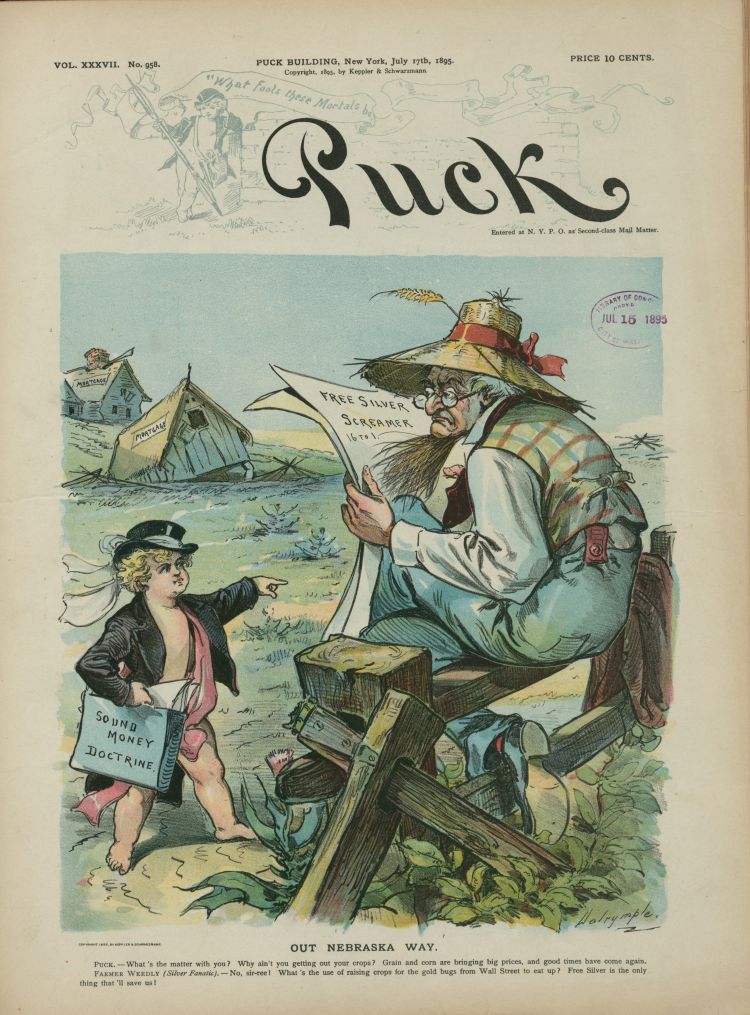
Summary: Print shows Puck carrying a valise labeled "Sound Money Doctrine", talking
to a hayseed farmer sitting on a fence, reading the "Free Silver Screamer"; in the background, houses
and barns labeled "Mortgage" are falling into ruin. (Artist: Dalrymple, Published by Keppler & Schwarzmann, 1895 July 17).
When Lou asks Carl Linstrum, who was
living in the East and who Lou expected to know something about
what New Yorkers were thinking as the 1900 election approached,
Carl doesn't answer the question. Instead Carl said to Lou "but
what do you folks out here have to kick about? You have the only
safe place there is""
Many New York newspapers and periodicals
would disparage Bryan in the 1896, 1900 and 1908 Presidential elections
and repeat images and themes in each election based on stoked up
fears about populism, anarchy, Free-Silver (16-1),
risks to the economy and losing democracy itself if Bryan was elected.
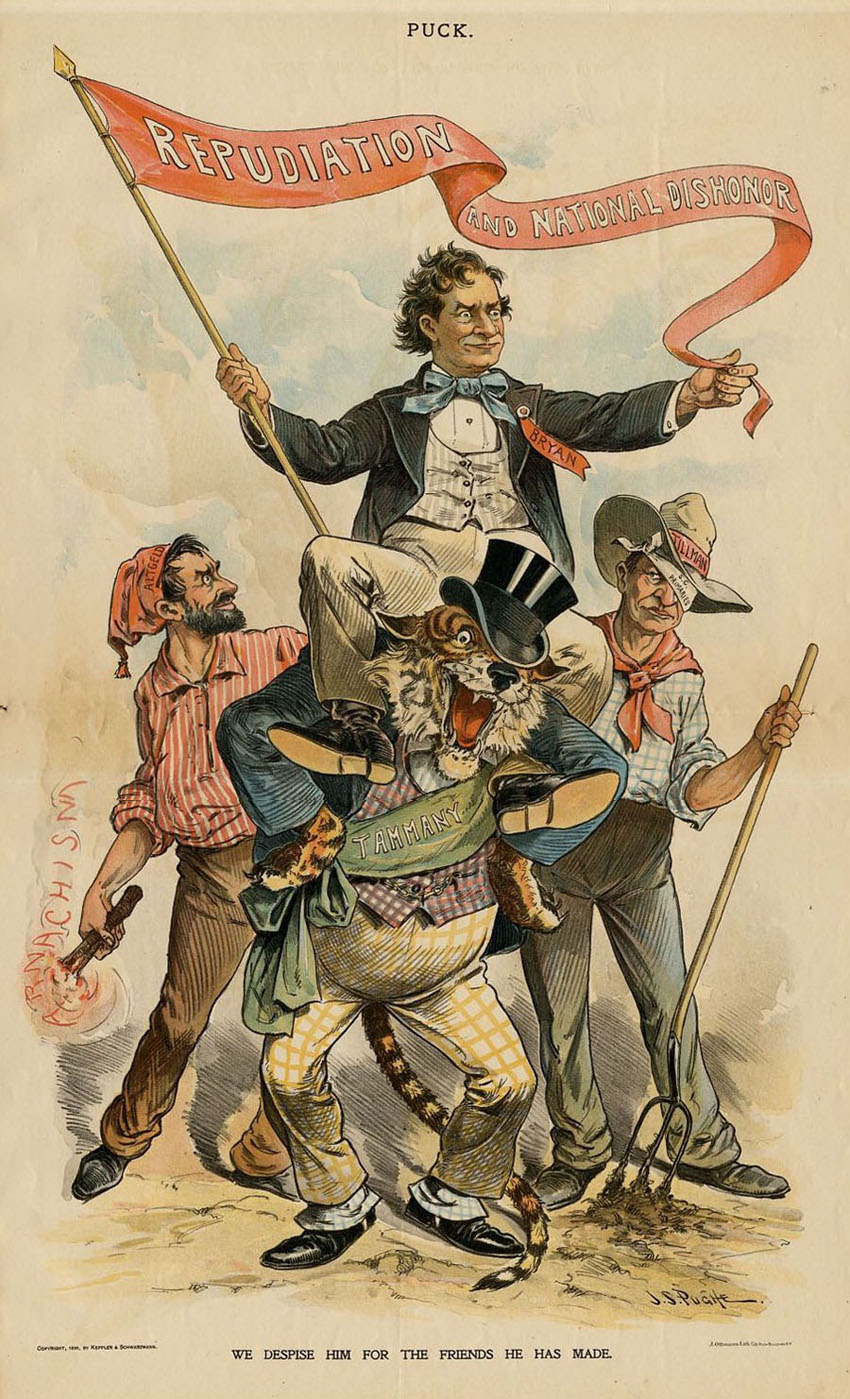
Puck, August 5,
1896
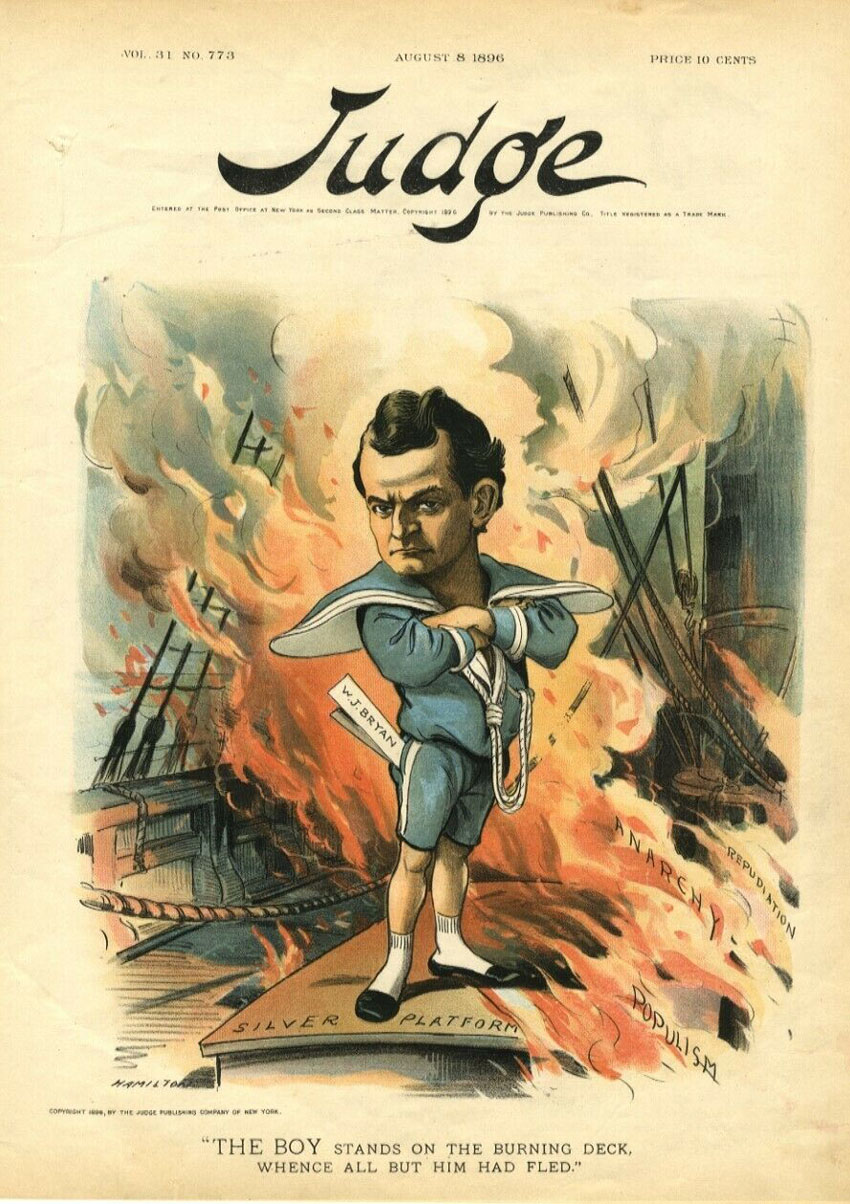
Judge, August
8, 1896
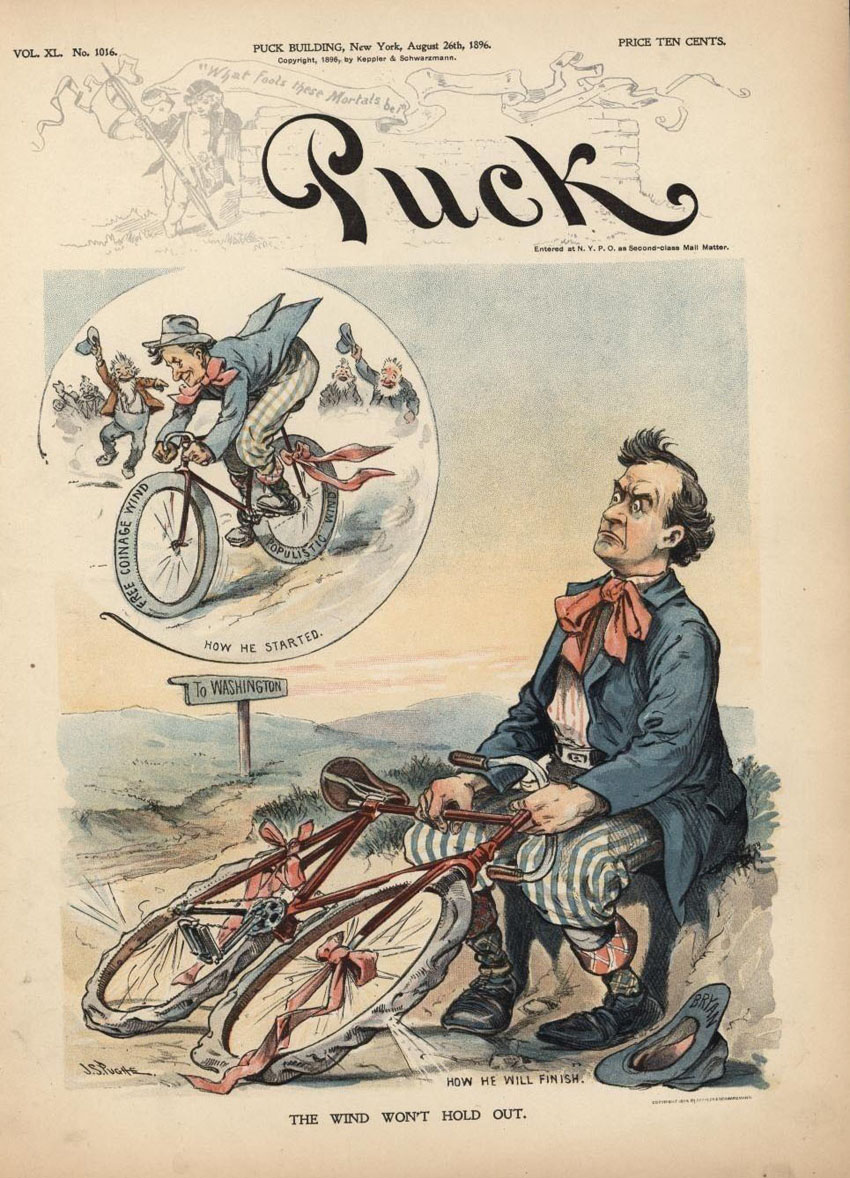
"The Wind Won't
Hold Out." Puck, August 26, 1896
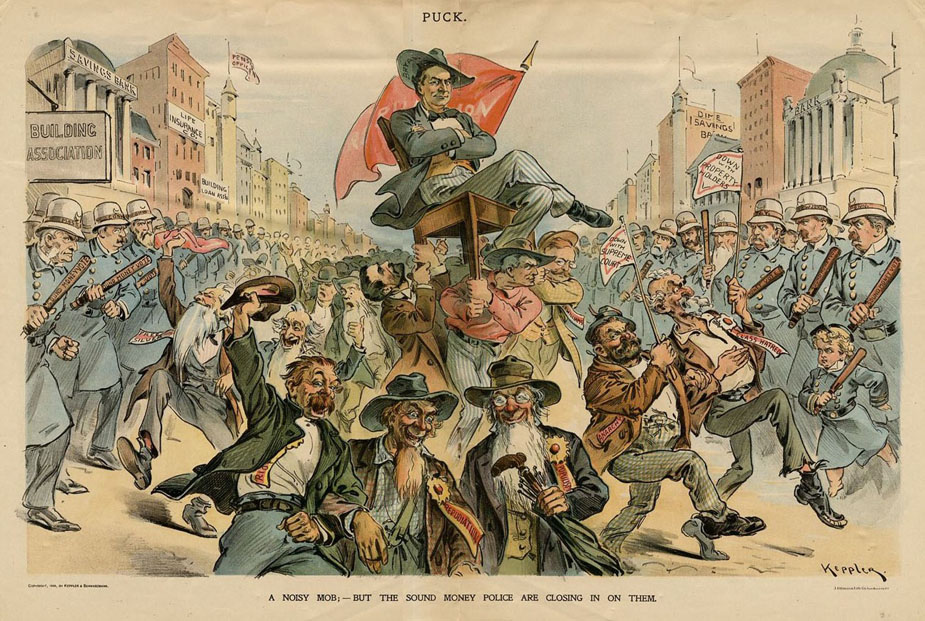
"A Noisy Mob,"
Puck, September, 1896
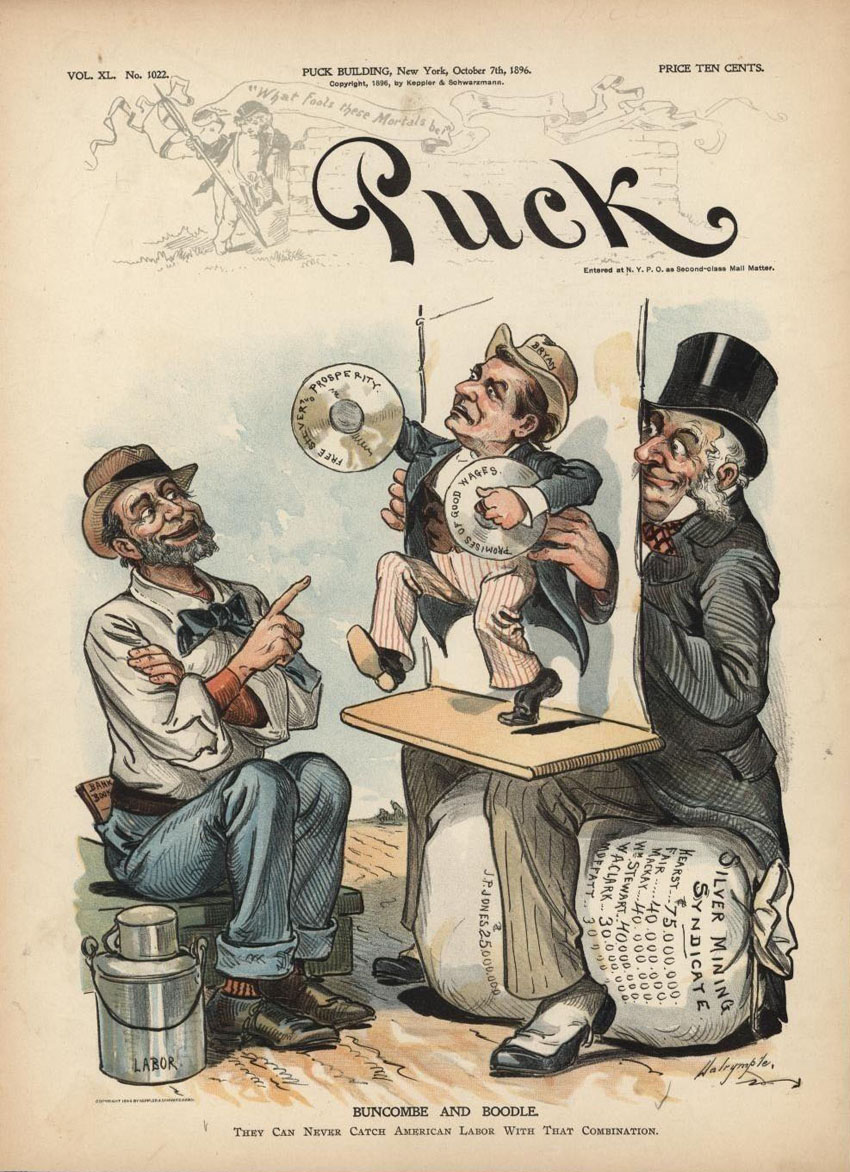
Bryan Controlled by
the Silver Mining Syndicate, Puck, October 7, 1896
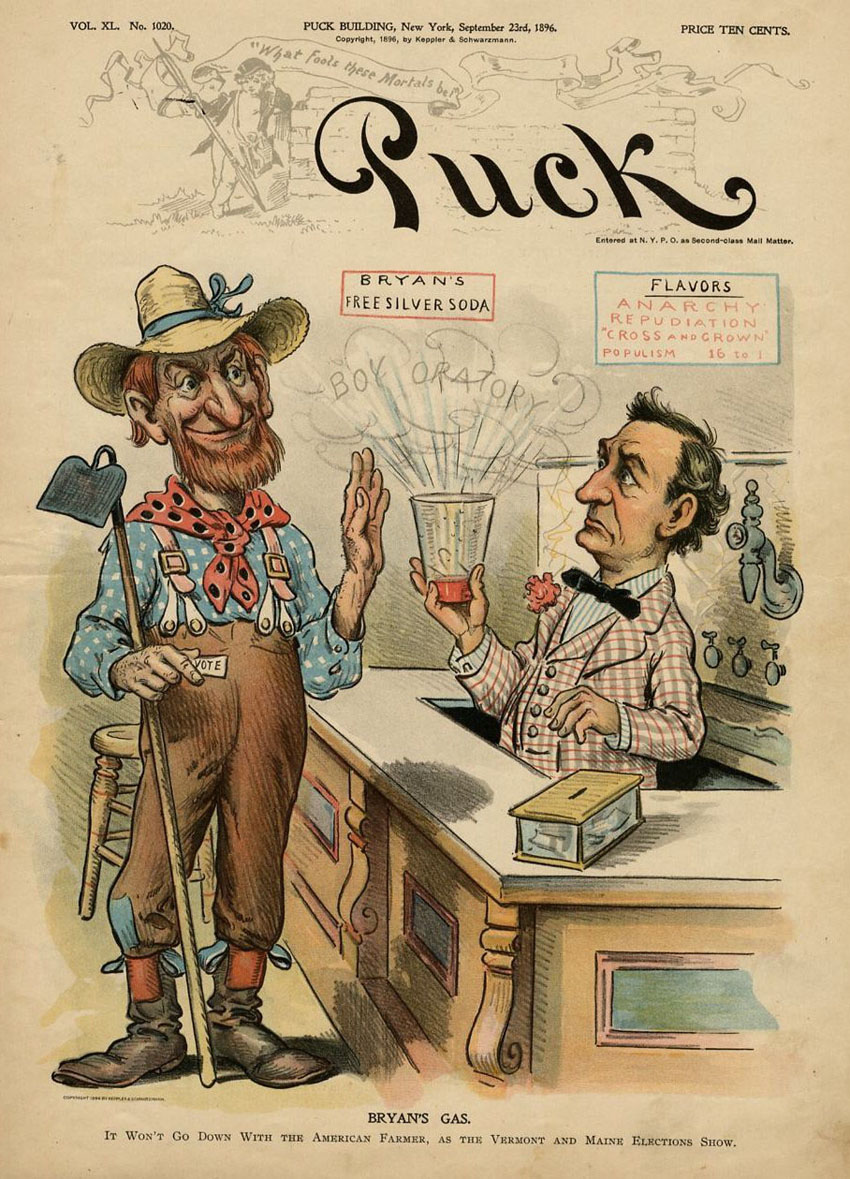
"Bryan's Gas,"
Puck, September 23, 1896 (PM-2099)
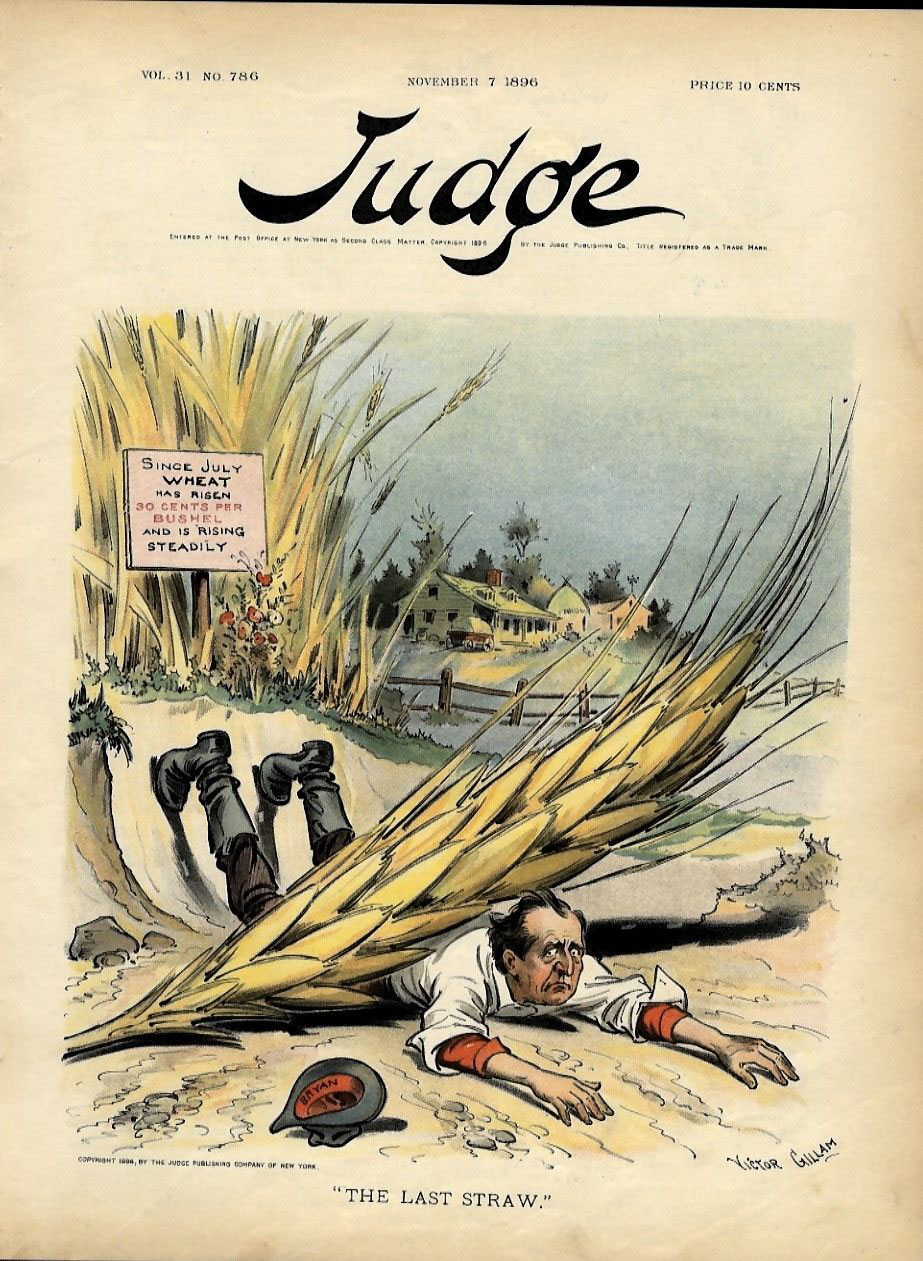
"The Last Straw."
Judge magazine, November 7, 1896 (Courtesy History Nebraska
Archives)
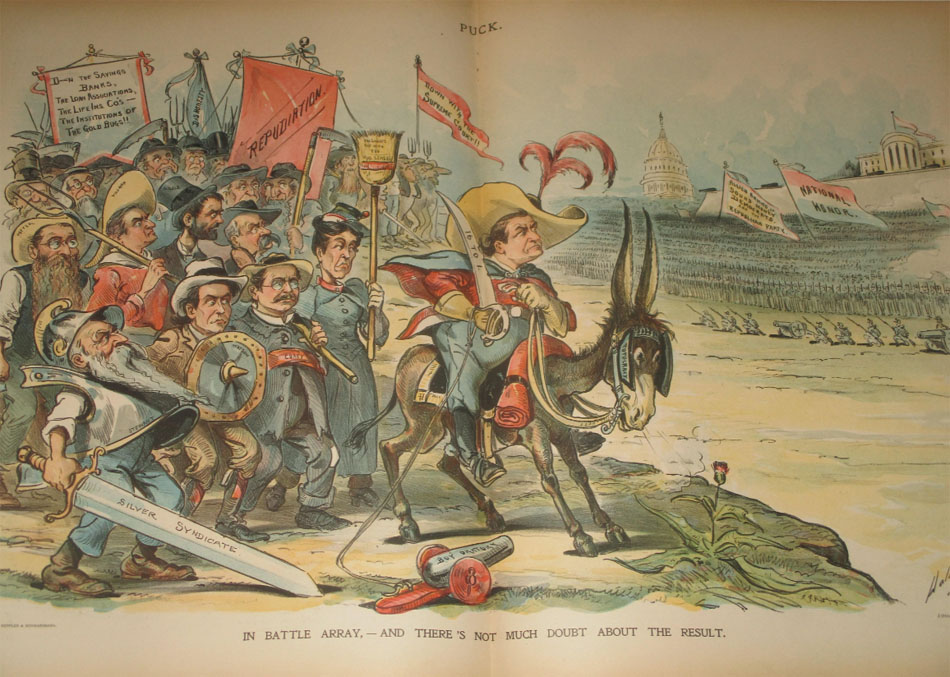
"In Battle Array,
-- And There's Not Much Doubt About the Result." Puck,
1896 by Louis Dalrymple
William Jennings Bryan
- Political Activist Mary Elizabeth Lease - Jacob Coxey - Silver Syndicate
and 16 to 1.
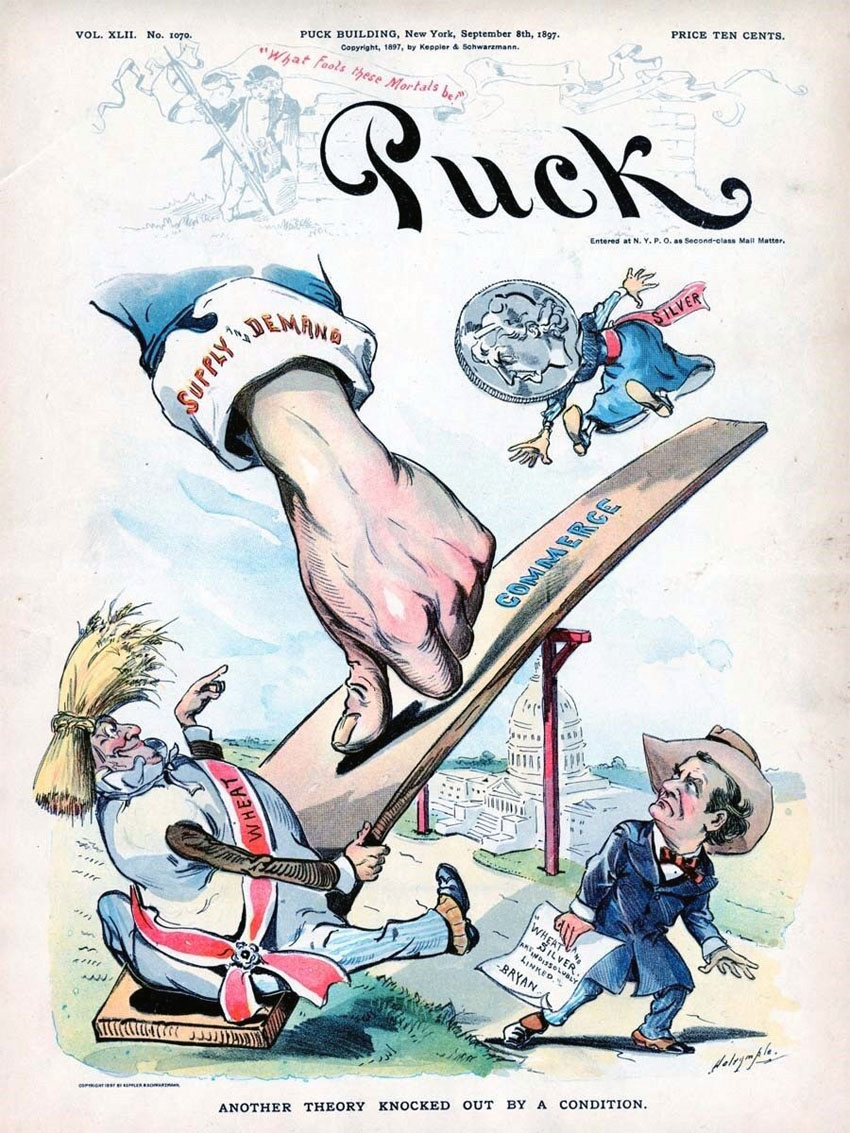
Wheat and Silver, Puck,
September 8, 1897
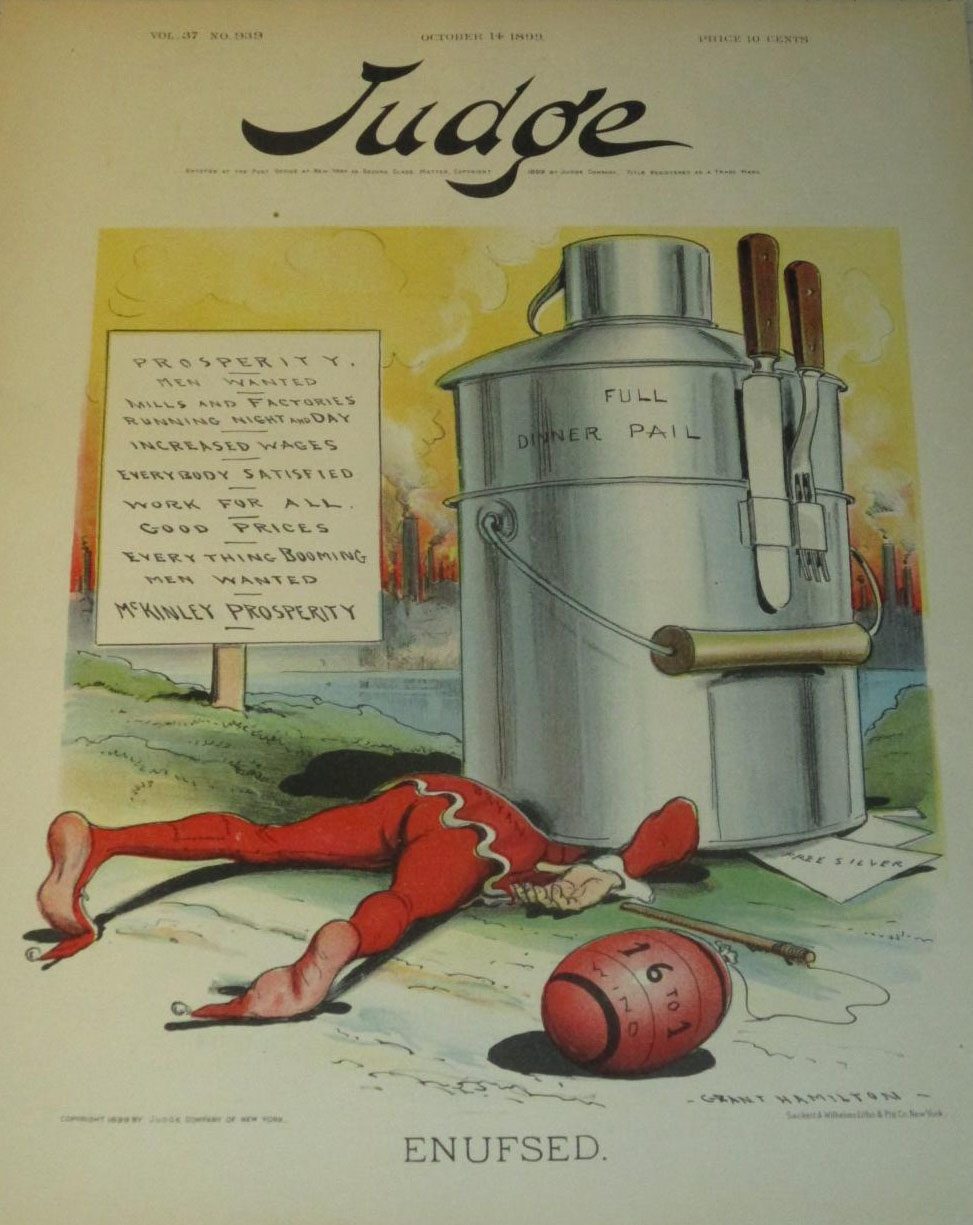
"ENUFSED."
Judge, October 14, 1899 by Grant Hamilton (PM-1832)
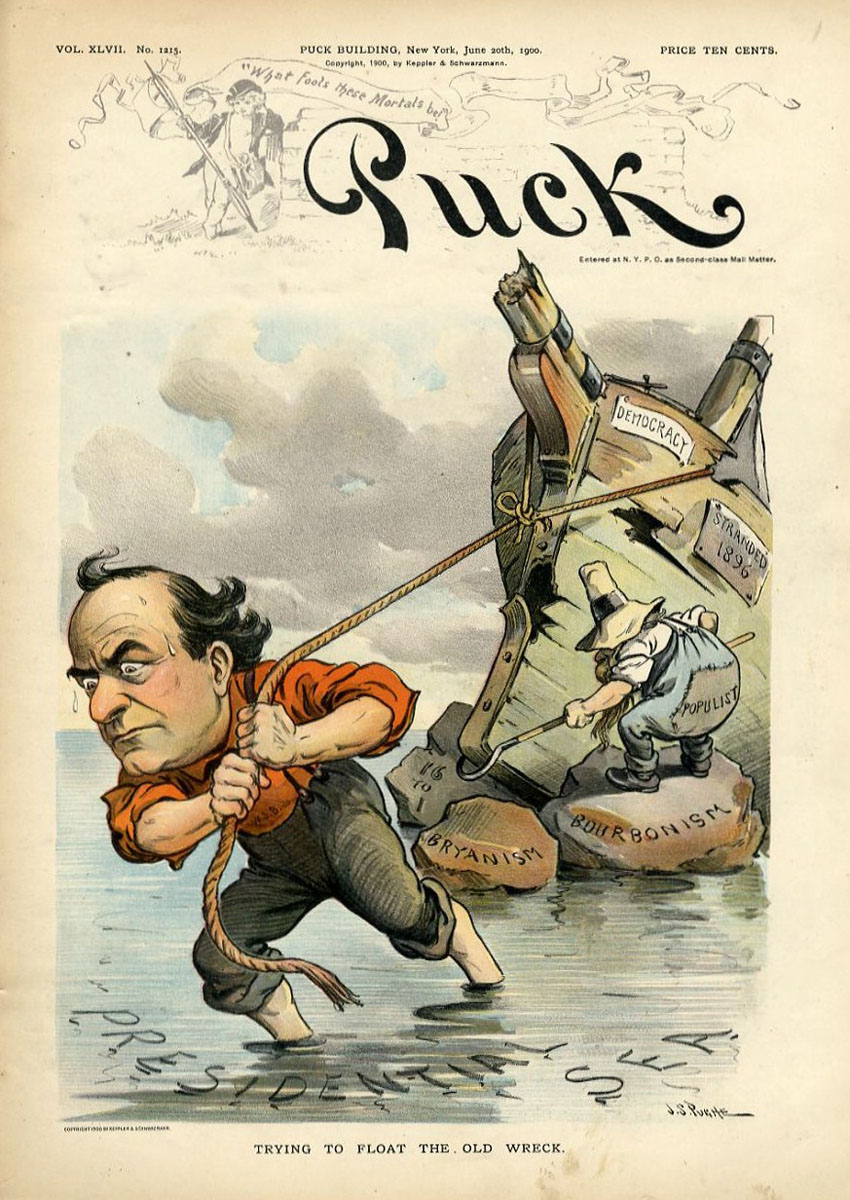
Campaigning in 1900 Presidential
Election, Puck, June 20, 1900
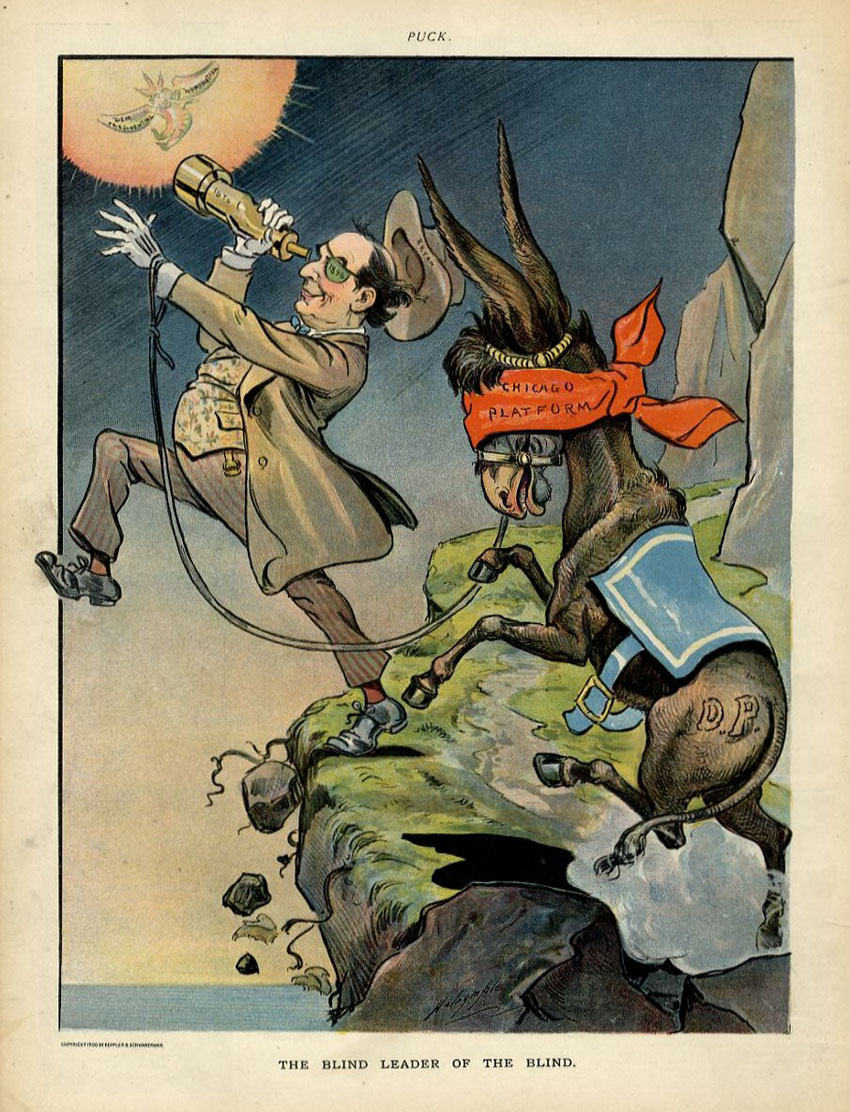
Puck, March 1900
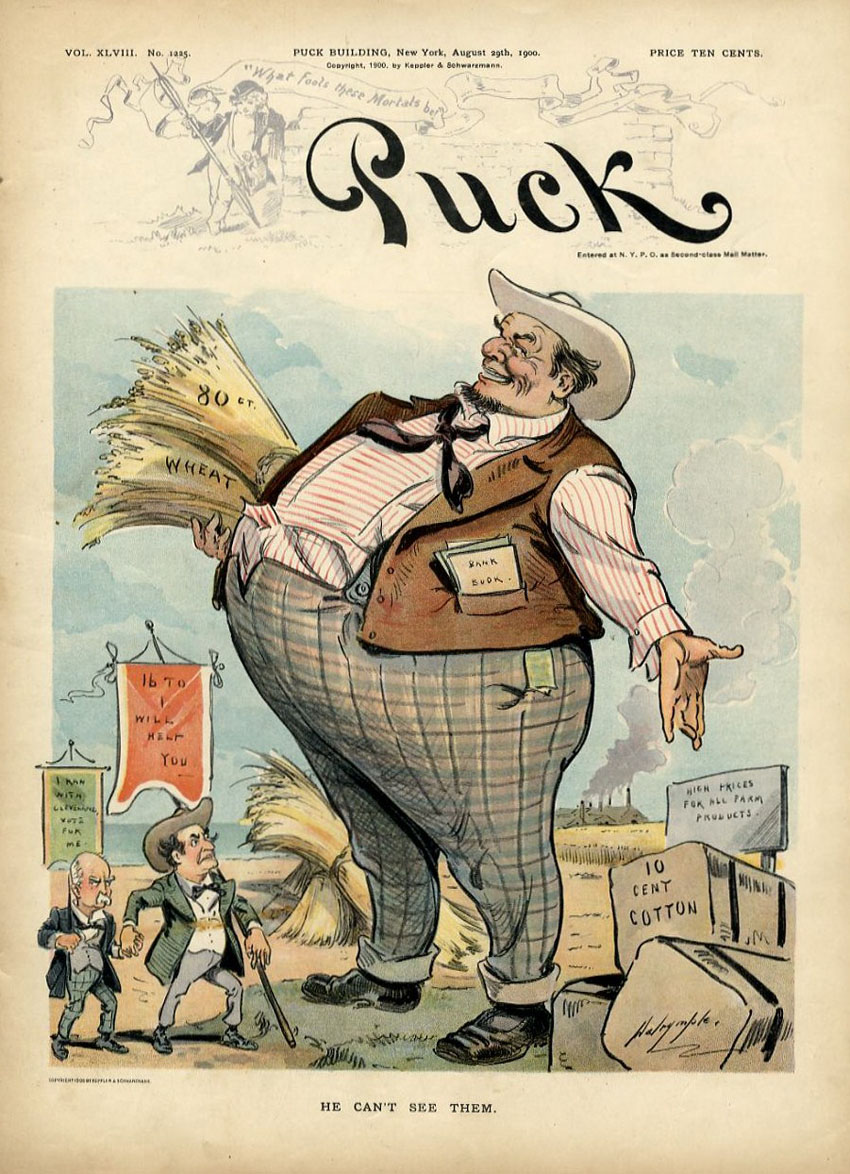
Current good prices
for farmers vs. the 16-1 Free Silver, August 29, 1900
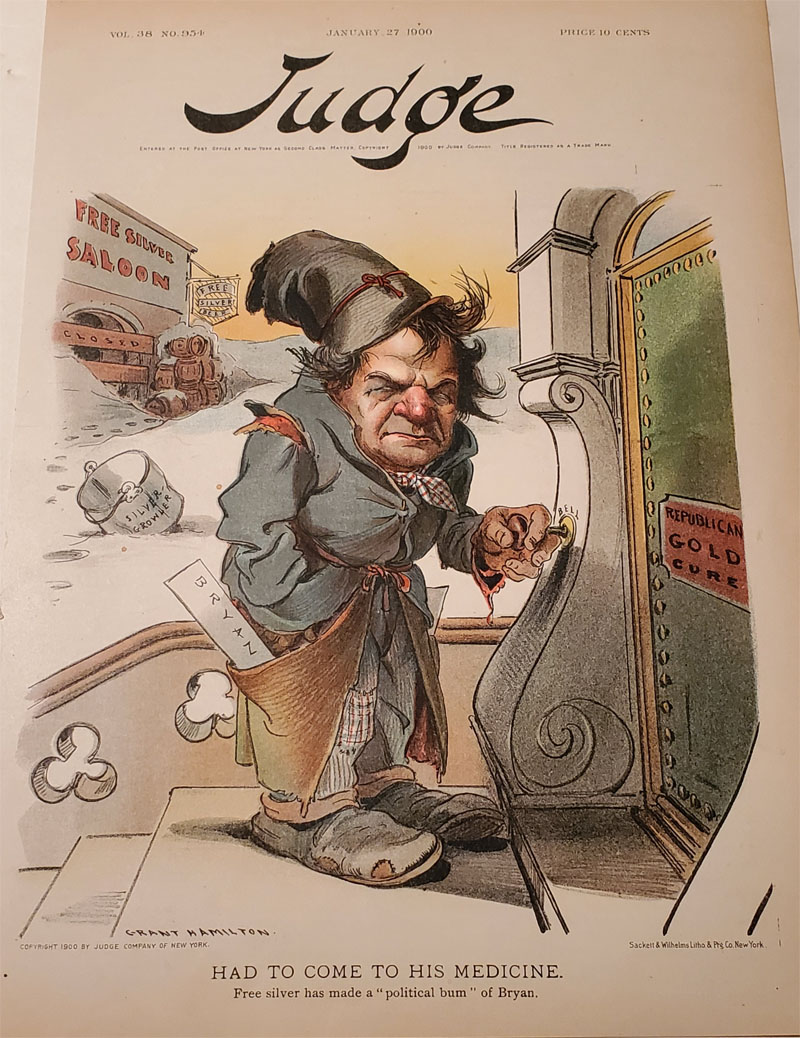
"Had To Come To His
Medicine" - William Jennings Bryan at the Republican Gold Cure Door,
Judge, 1900 by Grant Hamilton
�Well, what do folks in New York
think of William Jennings Bryan?�
In the 1896 Presidential Election
Bryan lost New York by nearly 19% of the vote. Bryan did win Nebraska
51.53% to 46.18%
In the 1900 Presidential Election
Bryan improved in New York, but still lost by 9.27% in the rematch
with McKinley. Bryan, however, lost in Nebraska by a margin of 3.24%.
In the 1908 Presidential Election
Bryan lost to Taft in New York by 12.37% (53.11% to 40.74%). Bryan
did win in Nebraska by 1.54% (49.14% to Taft's 47.60%).
One of Ours,
1922
"Bidding the eagles of the West
fly on . . ."
Explanatory Note No. 2 for title page
epigraph: "Bidding the eagles of the West fly on . . ."
"Bidding the eagles of the West
fly on . . .": This phrase is from Vachel Lindsay's 1919 poem
"Bryan, Bryan, Bryan, Bryan: The Campaign of Eighteen Ninety-Six,
as Viewed at the Time by a Sixteen Year-Old."
William Jennings Bryan (1860-1925),
a Nebraskan, headed the Populist movement in the United States
in the late nineteenth century; given his three unsuccessful runs
for the presidency, the reference to him suggests the decline
of the agrarian tradition in the United States. Lindsay recalls
seeing Bryan as "the bard and the prophet" of the people of the
Midwest and West, embodying "the hopes of all mankind," and asserts
that although his 1896 candidacy ended in defeat by eastern money
and corruption, Bryan established himself as a heroic figure.
On the one hand, then, Cather may be suggesting certain parallels
between Bryan and her protagonist, Claude Wheeler: both pursue
a cause, embody "the hopes of all mankind," and can be seen as
heroic figures. However, Janis Stout, noting the anti-Populist
and anti-Bryan views of Cather's staunchly Republican father,
suggests that Cather must have read Lindsay's poem as "foolish
blather" and used this epigraph ironically (Willa Cather 179).
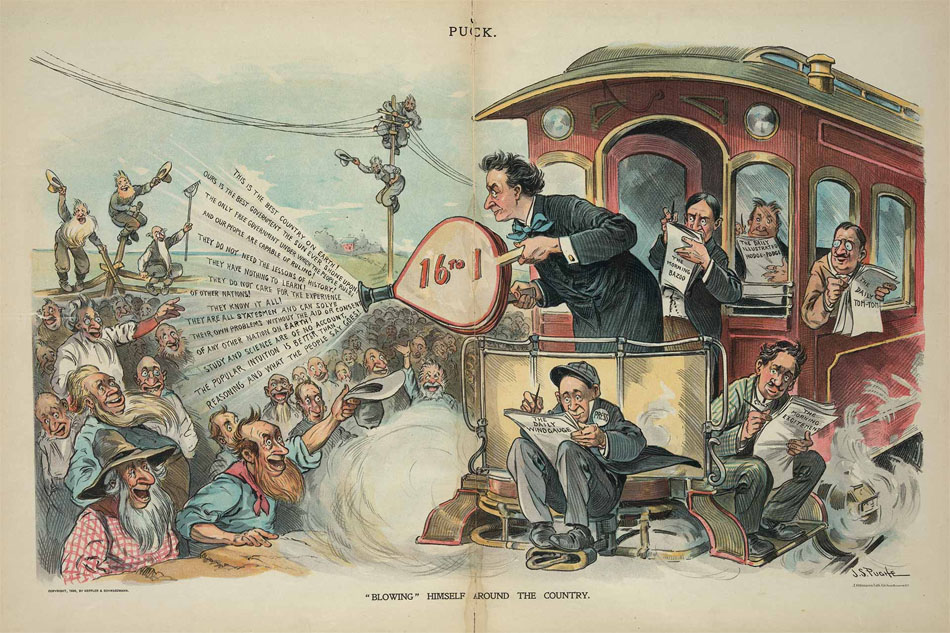
"Blowing"
Himself Around the Country. Puck, September 1896
Bryan campaigning from the train's
platform bellowing out populist messages. Artist: J.S. Pughe, 1896.
N.Y., Published by Keppler & Schwarzmann. Library of Congress.
Bryan's whistle-stop tours during
the 1896 presidential campaign were unprecedented. "Bryan took
four major railroad trips, giving stump speeches at nearly every
stop on the line." See "Railroads
and the Making of America � William Jennings Bryan's 1896 Campaign"
for a list of states and speeches given on those whistle stop
train trips. (1)
The revolutionary method of whistle-stop
campaigning by train was popular with the tens of thousands who
attended Bryan's speeches while McKinley famously sat on his front
porch. Bryan traveled 18,000 miles by train to give over 600 speeches
(36 in one day) to about five million people according to Jerry
Claire in his 2016 article for the National Museum of History's
"Stories from the Museum" about Bryan's
Cross of Gold speech and the Wizard of Oz.
Bryan gave a speech at the Red Cloud,
Nebraska Opera House during the 1896 campaign. Here is a link
to the speech Bryan gave on November 3, 1896 at School House
Square in Hastings, Nebraska.
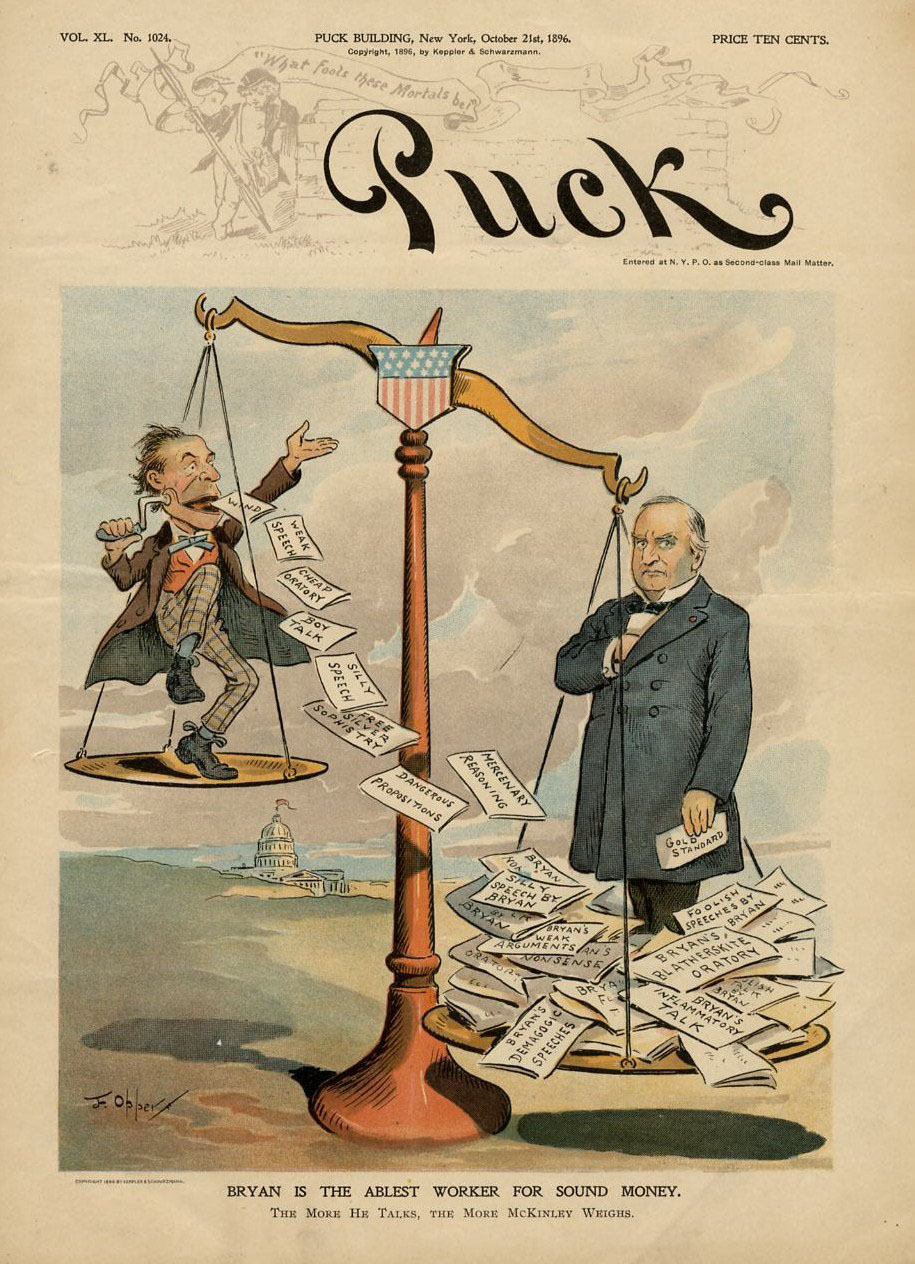
Bryan, The Talking Machine,
Puck, Jos. Opper. October 21, 1896 (PM-0527)
Willa Cather and
William Jennings Bryan
Cather wrote an essay entitled "The
Personal Side of William Jennings Bryan" under the pseudonym of
Henry Nickelman. James Woodress in Willa Cather: A Literary
Life, wrote "The occasion was Bryan's second nomination
for president by the Democratic National Convention in July 1900."
The following is extracted from Willa
Cather: A Literary Life by
James Woodress, Lincoln & London: University of Nebraska Press,
1987 - Chapter 5 "Turning Profession."
She met Bryan on a streetcar in
Lincoln when she was a "second prep." He was stumping the first
congressional district in his first campaign for public office,
which he won by a resounding margin. He had just made a speech
and was carrying an ugly floral tribute given him by his supporters.
A talkative old lady sitting near him inquired sympathetically:
"Is it for a funeral?"
Mr. Bryan looked quizzically at
the flowers and replied politely:
"Well, I hope not, madam."
After this encounter Cather saw
him occasionally. He lived in Lincoln and was always at home to
students in his library in the evenings, and he occasionally wrote
for the Hesperian when she was editor. She must have visited his
library a number of times, for she describes it in detail. It
fascinated her because it was so different�except for the classics�from
any library she would have collected: lives of American statesmen,
marked and annotated schoolboy-fashion; works on political economy,
mostly by quacks; much poetry of a didactic or declamatory nature;
little fiction more recent than Thackeray. "Mr. Bryan used always
to be urging us to read Les Mis�rables if we hadn't, and to re-read
it if we had. He declared that it was the greatest novel written,
yet I think he had never considered its merits or demerits as
a novel at all. It was Hugo's vague hyperbolic generalizations
on sociological questions that he marked and quoted." That was
one of Cather's favorite novels too, but for entirely different
reasons.
When Bryan was in good form, Cather
remembered, his conversation was "absolutely overwhelming in its
richness and novelty and power, in the force and aptness of his
illustrations. Yet one always felt that it was meant for the many,
not the few, that it was addressed to humanity, and that there
should be a stenographer present to take it down." Sometimes what
he said was strikingly original; sometimes it was trite. "He chipped
his eggs to the accompaniment of maxims . . . . He buttered his
toast with an epigram." She also heard him speak publicly in Red
Cloud at the funeral of a friend who had been a member of Congress,
but she could not have heard the famous "Cross of Gold" speech
that stampeded the Democratic Convention in Chicago in July 1896
and brought him his first nomination for president. Henry Nickelman
says he heard it, but Willa Cather was already in Pittsburgh.
For Cather, Bryan symbolized "the
entire Middle West; all its newness and vigor, its magnitude and
monotony, its richness and lack of variety, its inflammability
and volubility, its strength and its crudeness, its high seriousness
and self-confidence, its egotism and its nobility." He never made
a Democrat out of her or aroused any interest in politics, but
the campaign of 1896 did give her the denouement for "Two Friends."
Bryan is the only political figure she ever profiled. Like Carlyle,
whom she characterized as a bad political economist, she was also
inept and indifferent in the political realm. It was only the
kingdom of art that she cared about.
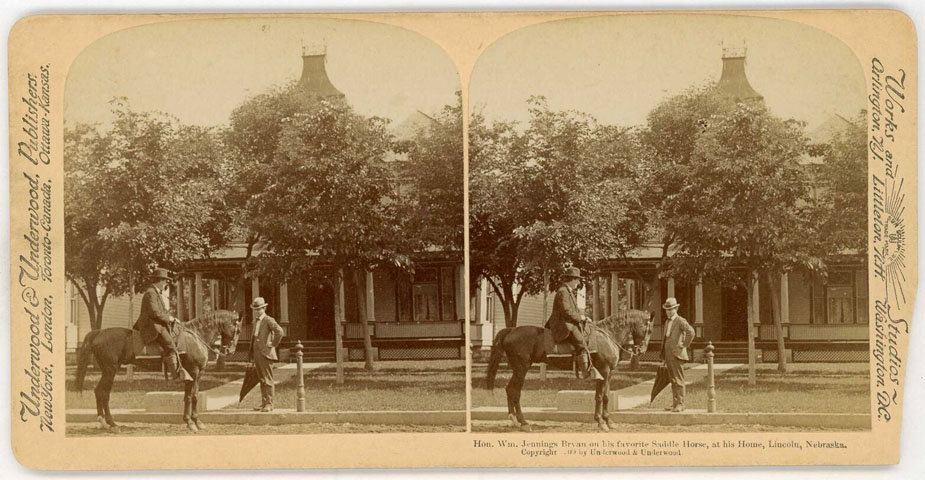
Stereoview
card of Bryan's Lincoln home 1625 "D" Street (prior
to Fairview home),1900 by Underwood & Underwood.
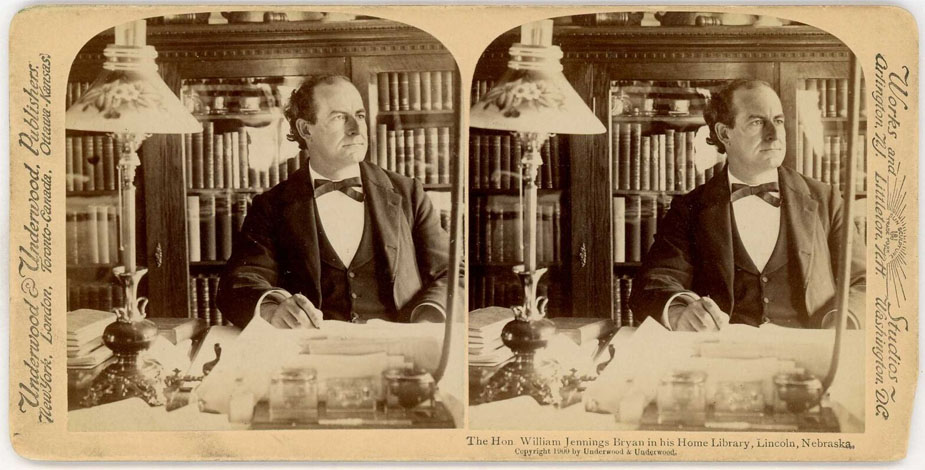
Stereoview
Card, Bryan in his Home Library, Lincoln, Nebraska, 1900 by Underwood
& Underwood.
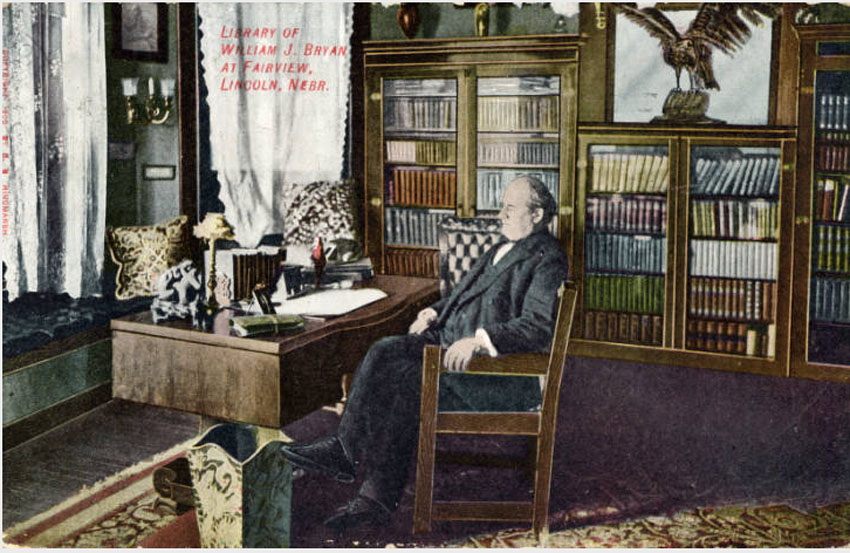
Postcard of Bryan's Library
at Fairview home c. 1910

RPPC Postcard of Bryan's
Residence, c. 1908 (Click for enlarged
image).
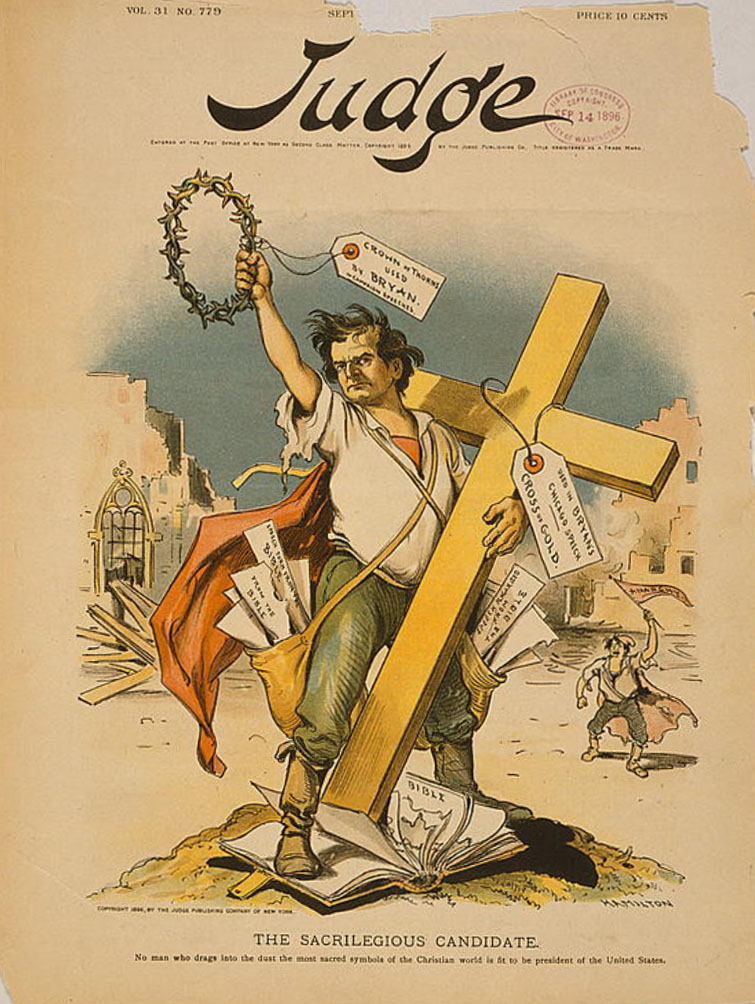
Bryan's "Cross
of Gold" Speech, Judge magazine, September 14, 1896
Illustrated by Grant Hamilton
"The Sacrilegious Candidate"
- William Jennings Bryan, full-length portrait wearing cape,
standing on open bible, facing front with large cross cradled in
left arm, holding crown of thorns overhead; in the background, on
the left is a vandalized church, on the right is a man wearing a
liberty cap and ragged cape, and waving a banner labeled "Anarchy".
(Library of Congress).
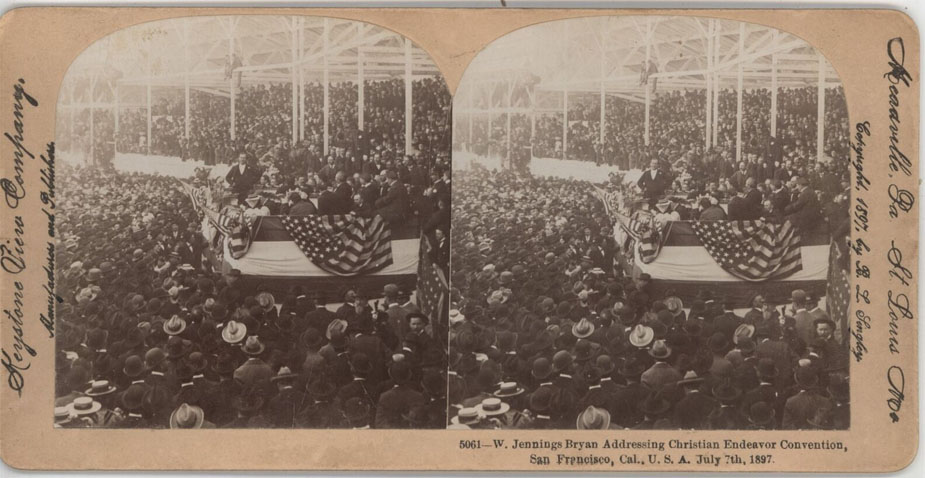
Bryan Addressing Christian
Endeavor Convention, July 17, 1897, Stereoview
card by Keystone View Company, 1897
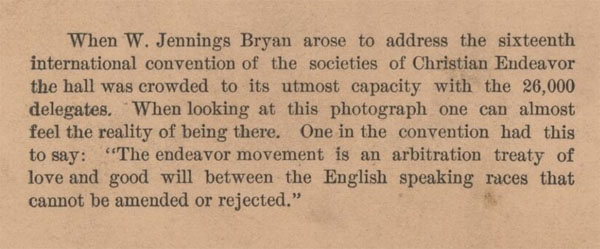
William Jennings Bryan and the
Phonograph
See Phonographia's Factola W.J.
Bryan and the Phonograph for popular culture connections of
Bryan and the Phonograph.
There is also a two-degrees separation
to Cather and Phonograph via 1) Cather's references to Bryan in
O Pioneers and One of Ours and 2) to William
Jennings Bryan and the Phonograph.

Phonographia
|

























